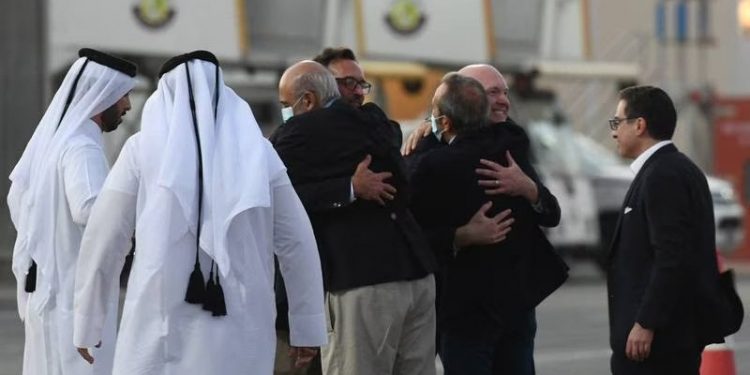China’s diplomatic manoeuvrings and successes in the Middle East seem to have forced the US not to waste any more time and cement its ties with Iran. The Biden administration does not appear to have been nettled by critics in the Republican Party who have accused it of bartering away US interests. Confronted with an unprecedented crisis of legitimacy at home, the Islamic Republic of Iran is relying heavily on its strategy to use hostages to ease its economic crisis. The policy is characterised by its use of foreign prisoners to extract concessions from the West. The latest success of this is the agreement reached with the US mediated by Qatar. The agreement involves a prisoner exchange and the release of $6 billion of Iranian funds, frozen in South Korea due to US sanctions. The money in Iranian assets – the proceeds of oil sales – were frozen under sweeping US oil and financial sanctions against Iran. Then president Trump in 2018 reimposed the sanctions when he pulled Washington out of a deal under which Iran had restricted its nuclear programme.
On September 11, Washington declared it was putting in place exemptions to assure the banks, involved in this money transfer, that they would not be placed under sanctions. The $6 billion, which are to be transferred to Qatari banks, are intended to be used to buy food and medicine which are in short supply in Iran fuelling widespread resentment among the populace. Iran desperately needs the money to stave off the snowballing economic crisis that has been compounded by the regime’s draconian treatment of the country’s women fighting against medieval social taboos imposed on them by the leadership.
For its part, Tehran released five Iranian-American prisoners from Evin prison, north of Tehran, and placed them under house arrest on August 10. They will be exchanged for five Iranians imprisoned in the United States. Of these, four were tried in US courts and sentenced to prison for violating sanctions against Tehran’s nuclear programme, or for attempting to send sensitive equipment and provide military information to Iran. US Secretary of State Antony Blinken called the move the first step of a process that would lead to their return home.
At the centre of the negotiations that forged this deal between the superpower which Iran brands as the “Great Satan” and the Islamic Republic which Washington calls a state sponsor of terrorism is the hugely rich state of Qatar. It hosted at least eight rounds of talks involving Tehran and Washington negotiators who were, funnily enough, sitting in separate hotels and speaking via gadgets as reported by media.
Qatar will implement a financial arrangement under which it will pay banking fees and monitor how Iran spends the unfrozen cash to ensure no money is spent on items under US sanctions and the prisoners will transit Qatar when they are swapped. Iran initially wanted direct access to the funds but in the end agreed to having access via Qatar.
That Iran has gained some measure of credibility among US allies is apparent from the fact that South Korean foreign minister Park Jin said efforts were under way to transfer Iran’s funds back to that country. The US-Iran relationship is not characterized by trust. Yet the US, under Biden, is now ready to judge Iran by its actions as indicated by the State Department.
Interestingly, the deal sidestepped the main US-Iran dispute over Iran’s nuclear aims, culminating in a rare show of cooperation between the long-time adversaries. They had been at daggers drawn on a host of issues from Iran’s nuclear programme to the US military presence in the Gulf.
Ties between the US and Iran soured when Donald Trump quit a nuclear deal with Iran as US president in 2018. Reaching another nuclear deal has slipped out of Biden’s agenda as he prepares for the 2024 US election.
However, there has not been much change in Washington’s overall approach to Iran marked by deterrence, pressure and diplomacy. Once the funds are transferred, they will be held in restricted accounts in Qatar and the US will have oversight as to how and when these funds are used so as to forestall any attempt by Iran to divert them to purposes other than humanitarian.
The transfer of funds plan has drawn Republican criticism that Biden, a Democrat, is in effect paying ransom for US citizens. But, the criticism is not wholly justified as the Biden administration has made it clear that the deal does not mean that Iran would be getting any relief from sanctions.
The US claims it would continue its policy against Iran’s “destabilising” activities in the region. It has only toned down its antagonism towards Iran in the backdrop of China’s friendly policies in the Middle East that has been instrumental in making sworn enemies in the region friends. Hopefully this arrangement will continue until the coming presidential election. There will obviously be a re-look at the Iran policy after the election if power changes hands.






































